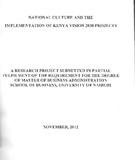| dc.description.abstract | The objective of this research was to examine National Culture and the implementation of the Kenya Vision 2030 projects. Most nations prepare long term strategic plans, also known as economic development plans that aim to improve the standards of living of their citizens through the proper management of resources. The Kenya Vision 2030 was developed through consultative efforts of ordinary Kenyans, stakeholders of all levels in government, the private sector, civil society, the media and non-governmental organizations with the aim of establishing an in-depth understanding of the country's development problem and the necessary strategies that would achieve the 2030 goals.
As the implementers of the vision were spread throughout the government bodies there has been to date mixed results. The objective of this research was to explore the role that National Culture as one of the socio-cultural factors that may be influencing the successful implementation of Kenya Vision 2030 projects and to seek recommendation that would ensure that the next mid-term phase of implementation would be achieved more smoothly. Implementation of strategy is normally harder than it appears because a lot depends on personal interpretation of roles, utilization of resources and management of people to achieve success. The organizations that were interviewed were mainly parastatals or private sector that has worked closely with ministries to achieve flagship projects.
Primary data was collected through in-depth interviews using a structured interview guide with open-ended questions to avoid subjectivity. A series of in-depth interviews
was conducted using guided open ended questions to collect the data. The respondents were mainly from the public sector domain as this is the focus area given the context of the study; the Kenya Vison 2030 projects. As the data collected was qualitative in nature the analysis was in the form of content analysis.
This works presents findings that examines the roles and relationships of national culture and the implementation of Kenya Vision 2030 strategies and presents recommendations that can be put to use to improve the implementation processes of the next 5 year plan projects for the Vision, successfully.
This work also identifies a few recommendations that may correctly address the role of National Culture and how it affects our abilities to successfully implement strategy especially in the public sector (Government). | en_US |

